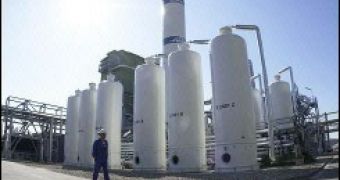The U.S. fuel dependency could become a thing of the past. The U.S. hopes that in about twenty year, all the cars running on the American roads will be powered by cheap, clean and practical hydrogen fuel to replace the oil. In 2003, president George W. Bush, allocated 1.2 billion dollars, to make hydrogen in the hope that this will reverse the future dependency on foreign oil. However, critics say that the possibility of that happening in twenty years is far away from reality since the Bush administration no longer supports the original plan.
To get the industry needed to produce hydrogen fuel at the rate at which the gasoline is produced nowadays, and develop hydrogen storing techniques to get the fuel in the cars, plus the time needed to create the infrastructure for fueling - could however take more than twenty years. Using hydrogen fuel to power cars or to produce energy has a lot of advantages since it is non-pollutant, can be relatively easy to extract from water, which is one of substances Earth is the richest in, and can produce much more power than the alternative fuel, such as methanol, natural gas or oil; but because it is so light, it is very difficult to stock and transport.
Most of the universities and the research centers, studying alternative renewable fuels, have lately concentrated their research on finding better ways of efficiently producing hydrogen. The latest developed method uses a combination of bacteria and a small electrical charge to stimulate it to produce hydrogen. Hydrogen gas can be extracted by a number of ways, out of coal, natural gas, water, wind, nuclear power but the most cost efficient way to produce it, still involves using biological methods.
The auto giant General Motors, predicts that by 2010-2012, they will produce competitive, high-performance fuel cell cars. But the biggest problem is not posed by technological issue, but rather by the lack of infrastructure to provide the necessary quantities of fuel. During all this time, the automakers are launching hydrogen powered car prototypes, to prove the efficiency of the cars that use this kind of fuel.
Last Wednesday, Honda announced that it will produce by the next year, a zero-emission car, named FCX Clarity, for customers in the U.S. on a limited long-term lease basis for a price of around 600 dollars a month. A similar car has also been developed by BMW, that can be run on both hydrogen or gasoline fuel. Calculations show that if half of the cars circulating in the U.S. were converted to hydrogen fuel by the year 2050, the oil imports could drop by up to two-thirds, thus reducing the harmful greenhouse gas emissions which cause the global warming effect.

 14 DAY TRIAL //
14 DAY TRIAL //